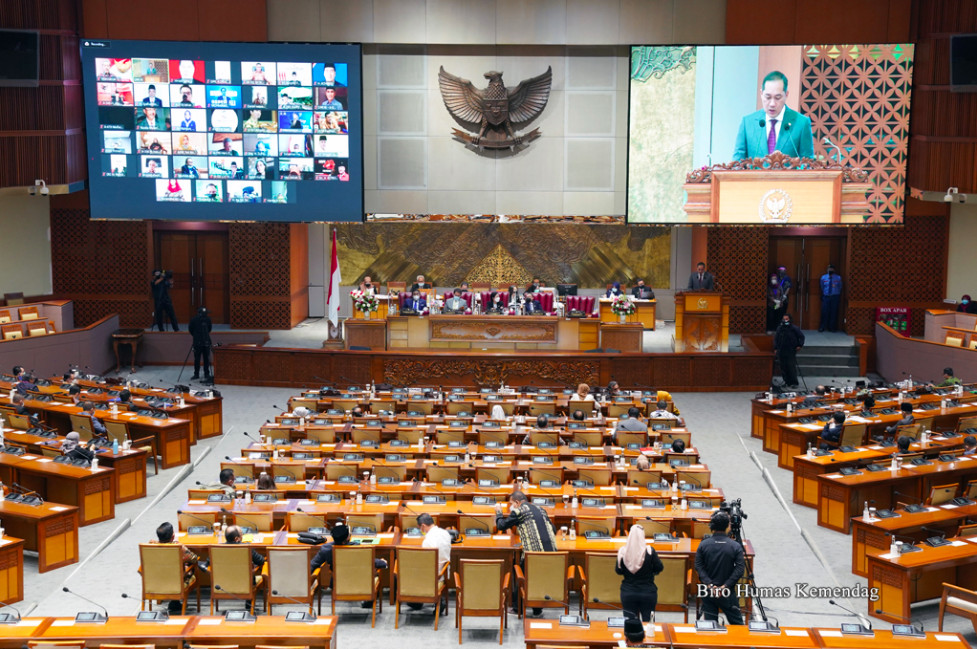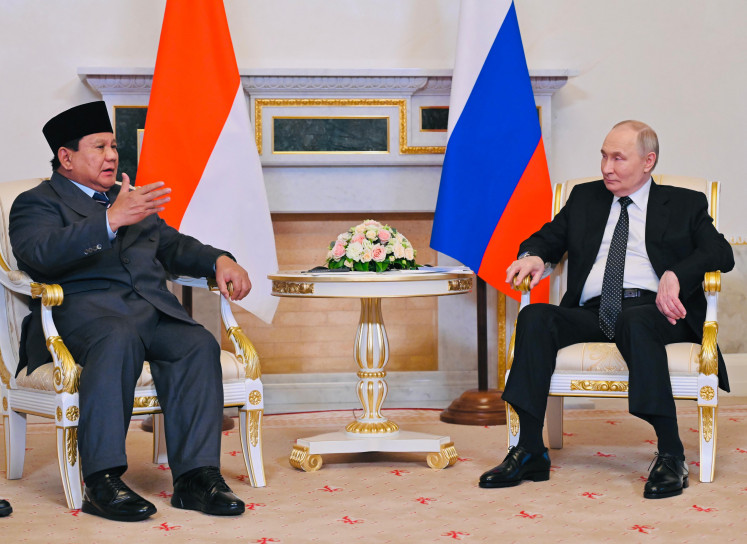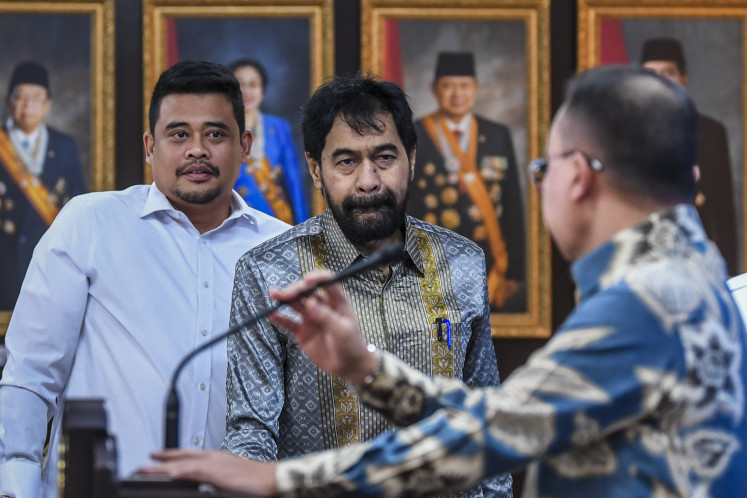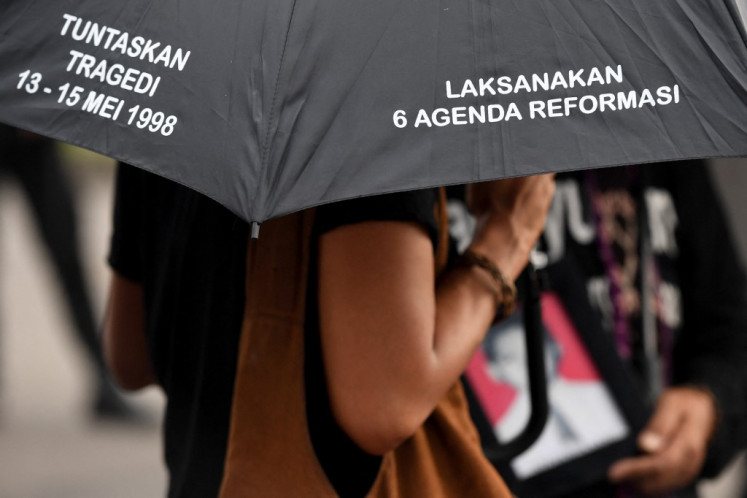Popular Reads
Top Results
Can't find what you're looking for?
View all search resultsPopular Reads
Top Results
Can't find what you're looking for?
View all search resultsOptimizing the results of Indonesia's trade negotiations
A merchant mindset might seem contradictory to the overall purpose of diplomacy, but imbuing diplomats with mercantile perspectives and capabilities could be highly effective in boosting Indonesia's position in international trade negotiations and what the country gets out of them.
Change text size
Gift Premium Articles
to Anyone

I
have high respect for Pak (Mr.) Kornelius Purba, a senior journalist with abundant experience. He has a deep understanding of the nation and its institutions. I just happen to have the knowledge and experience to look at the issue from a different perspective, but for the same purpose.
In his article “Expanding the Foreign Ministry as Jokowi had in mind four years ago” (July 24, 2023, The Jakarta Post) Pak Kornelius strongly proposes merging part of the Trade Ministry into the Foreign Ministry, particularly the department responsible for negotiating international trade deals. The reason he gives is that the promotion and protection of Indonesian international trade and investment have not been effective.
According to Pak Kornelius, this view is strongly shared by some senior and mid-level diplomats at the Foreign Ministry.
His hypothesis is that the government will be more effective in promoting Indonesian trade and investment, as well as in protecting the country’s trade interests, if diplomats at the Foreign Ministry and Indonesian embassies are entrusted with overseeing the development and execution trade and investment policies.
"Indonesian diplomats must think like merchants” is what Foreign Minister Retno LP Marsudi instructed all diplomats alike, whether they are career or noncareer, working in the country or posted overseas, including ambassadors.
If embassy staff are civil servants of the Foreign Ministry, Indonesian ambassadors come from various backgrounds, including businesspeople, politicians, military officers and artists. And career diplomats, junior or senior, are mostly with an international relations educational background.
A merchant mindset is potentially contradictory to a diplomatic role. A diplomat’s goal should be to foster good ties without commercial profits in mind, so instilling a mercantile mindset is likely to disrupt or even corrupt this diplomatic objective.
International trade negotiations require thorough understanding of trade and commercial regulations and realities, which are many, complex and ever-changing. People spend their entire careers understanding and following them.
Around 80 percent of the work in trade negotiations is done at home, not overseas. It requires constant and close engagement with domestic industries to arrive at the right balance between national needs and international policies.
Merging ministries isn’t new for the Trade Ministry. In fact, this has been done several times in its history. But more often than not, these structural changes failed to produce the desired results because the changes were little more than organizational and were not underpinned by rigorous studies, and more importantly, they lacked a clear and new concept toward achieving these same goals more effectively under a new structure.
When the industry and trade ministries were merged in 1996, the resulting new Industry and Trade Ministry basically ran like two separate ministries under one roof. The exception was the formation of a new directorate general responsible for industrial cooperation and international trade, which was established in recognition of the new multilateral trading system.
The Multilateral Trade Agreements of 1994 was a new game in trading with the over 160 member countries of the World Trade Organization. The deal was then ratified by the House of Representatives and enacted as Law No. 7/1994, under which the Indonesian government (and all signatories to the agreement) must abide by the agreements’ terms in issuing domestic trade rules and regulations.
It is also important to note that Law No. 7/20014 on trade lays the legal foundation of the Trade Ministry. Article 82 of the law, which concerns international trade cooperation, stipulates: (1) in order to increase market access and protect national interests, the government may conduct trade cooperation with other states and or international institutes/organizations; (2) trade cooperation as referred in point (1) may be held through international trade agreements. Therefore by law, the trade minister has full responsibility for conducting international trade negotiations and diplomacy.
Article 86, point (1) stipulates that in conducting international trade negotiations, the government may establish teams to prepare and execute negotiations.
The law also stipulates that the ministry is responsible for protecting Indonesian industries against dumping or an increase in imports that cause or threaten to cause serious harm.
If our goal is to optimize our government’s effectiveness in this area, it is more important to strengthen the capacity and capabilities of the Trade Ministry’s existing Directorate General of International Trade Negotiations.
This entails:
1. Developing a national trade negotiations coordination team as a means to coordinate all relevant ministries and state institutions in developing Indonesia’s position on national interests. Members of this team must be at the ministerial level, assisted in executing their daily duties by echelon 1 and 2 officials, just to ensure that decisions are implemented.
2. Continuously upgrading trade negotiators, who are divided into interdepartmental teams that specialize in different negotiation topics. This includes, but is not limited to, upgrading their English language skills and knowledge of negotiations history.
3. Training junior officials across departments on developing their negotiation skills and their understanding of the “legal” aspects of multilateral trade agreements. The top 10 percent of these officials will assist negotiators in the field.
***
The writer is a former director general of the Industry and Trade Ministry (1998-2001), a former ambassador to Norway (2002-2005) and a former secretary-general of the Trade Ministry (2005-2008).








